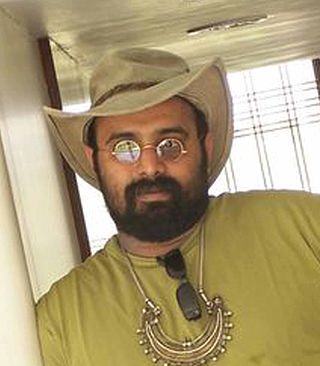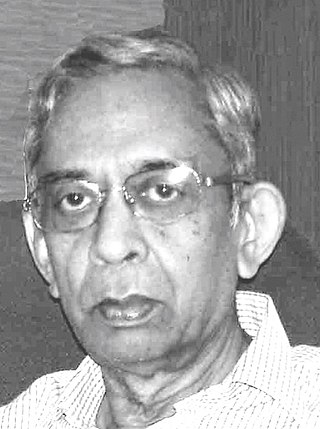
Rajesh Touchriver is an Indian film director, screenwriter, and produce known for his works in English, Malayalam, Telugu, and Hindi language films. He received various National and International honors for his works. In 2002 he directed In the Name of Buddha which was later screened in the Spotlight on India section at the 2003 Cannes Film Festival. In 2013, he scripted, and directed the social problem film Naa Bangaaru Talli which won five International honors, the National Film Award for Best Feature Film in Telugu, and four state Nandi awards including Second Best Feature Film.

The Pink Mirror, titled Gulabi Aaina in India, is an Indian film drama produced and directed by Sridhar Rangayan. It is said to be the first Indian film to comprehensively focus on Indian transsexuals with the entire story revolving around two transsexuals and a gay teenager's attempts to seduce a man, Samir. The film explores the taboo subject of transsexuals in India which is still much misunderstood and ridiculed.

Sridhar Rangayan is an Indian filmmaker who has made films with special focus on queer subjects. His queer films, The Pink Mirror, Yours Emotionally, 68 Pages, Purple Skies, Breaking Free & Evening Shadows have been considered groundbreaking because of their realistic and sympathetic portrayal of the largely closeted Indian gay community. His film The Pink Mirror remains banned in India by the Indian Censor Board because of its homosexual content.

The 2003 Sundance Film Festival took place from January 16 to January 26, 2003. American Splendor, a biopic of comic-book author Harvey Pekar, won the grand-jury prize. Steve Zahn and Maggie Gyllenhaal presented the awards in a ceremony televised live on the Sundance Channel.

Solaris Pictures is an Indian film production company based in Mumbai. It was created by Sridhar Rangayan, and Saagar Gupta in 2001. The two have gone on to create several award-winning films under Solaris Pictures' banner, focusing on LGBT issues and HIV/AIDS.

Dhvani Desai is an Indian animation filmmaker, curator and poet. She is best known for her artistic animated films Manpasand and Chakravyuh.

Ram Mohan was an Indian animator, title designer and design educator, who was also known as father of Indian Animation and was a veteran in the Indian animation industry, who started his career at the Cartoon Films Unit, Films Division of India, Government of India in 1956. He was chairman and chief creative officer at Graphiti Multimedia, a Mumbai-based animation company which was established in 1995, and later he also established the Graphiti School of Animation in 2006.

Bongu Narsing Rao is an Indian film director, screenwriter, littérateur, composer, poet, producer, actor and painter known for his works in Telugu cinema, and Telugu theatre. Rao has garnered five National Film Awards, three Nandi Awards, various international honors, and has served as a jury in various Asian film festivals. He directed, Daasi "(Bonded Woman)" and Matti Manushulu "(Mud People)" which won the Diploma of Merit awards at the 16th and 17th Moscow International Film Festivals in 1989 and 1991 respectively.
Kanu Behl is an Indian film director and screenwriter. He is known for his work in Hindi cinema.

FILMFEST HAMBURG is an international film festival in Hamburg, the third-largest of its kind in Germany. It shows national and international feature and documentary films in eleven sections. The range of the program stretches from art house films to innovative mainstream cinema, presenting the first feature films of young unknown directors together with films by internationally established directors. In 2017 more than 40,000 people attended 250 screenings of 141 films.
Kick in Iran is a feature documentary by Fatima Geza Abdollahyan. It portrays Taekwondo fighter Sara Khoshjamal-Fekri on her way to the Olympic Games 2008, in Beijing. Sara Khoshjamal Fekri is the first female athlete from Iran to ever qualify directly for the Olympic Games.
Aarti Shrivastava is a national award-winning Indian documentary filmmaker and Asia 21 IPRYLI Fellow based in Mumbai.
Dylan Mohan Gray is an Indian and Canadian filmmaker. His documentary feature film Fire in the Blood, premiered in competition at the 2013 Sundance Film Festival and went on to enjoy the longest theatrical run of any non-fiction film in Indian cinema history . An official selection at over 100 leading film festivals which was honoured with major awards and accolades worldwide, Fire in the Blood altered the global conversation around access to essential medicine, and in 2018 was named one of "26 landmark documentary films of the past seven decades" in a major retrospective curated by legendary documentarian John Pilger.

Vipin Vijay is an Indian film director and screenwriter. He received his post-graduate degree in filmmaking from the Satyajit Ray Film and Television Institute SRFTI, Calcutta. He received the Charles Wallace Arts Award for research at the British Film Institute, London, 2003. Vipin is the recipient of "The Sanskriti Award" (2007) for social & cultural achievement. His works are made under independent codes and defy any categorisation eluding all traditional genre definitions and merge experimental film, documentary, essay, fiction all into one.

Sanal Kumar Sasidharan is an Indian poet, lawyer, and filmmaker.
The 2022 Sundance Film Festival took place from January 20 to 30, 2022. Due to COVID-19 pandemic protocol, it was initially intended to be an in-person/virtual hybrid festival, but on January 5, 2022, it was announced that the in-person components would be scrapped in favor of a wholly virtual festival due to the SARS-CoV-2 Omicron variant. The first lineup of competition films was announced on December 9, 2021.

Writing with Fire is a 2021 Indian documentary film directed by filmmakers Sushmit Ghosh and Rintu Thomas about the journalists running the Dalit women led newspaper Khabar Lahariya, as they shift from 14-years of print to digital journalism using smartphones. It is the first Indian feature documentary to be nominated for an Academy Award for Best Documentary Feature.
Sushmit Ghosh is an Academy award nominated filmmaker based in India. His Peabody-award winning documentary film, Writing With Fire, became the first Indian feature documentary to be nominated for the Academy Award for Best Documentary Feature. It premiered at the 2021 Sundance Film Festival, winning the Audience Award as well as the Special Jury Award in the World Cinema Documentary Competition. Ghosh’s work has also been nominated for the Grierson, IDA and PGA awards. He is a co-founder of the award-winning production company, Black Ticket Films and a member of the Academy of Motion Picture Arts and Sciences.
Rintu Thomas is an Academy Award nominated documentary filmmaker and director-producer from India.

Shaunak Sen is an Academy award nominated Indian filmmaker, video artist and film scholar. His documentary film on environmental issues, All That Breathes, won the Grand Jury Prize in the World Cinema Documentary Competition at 2022 Sundance Film Festival and the Golden Eye award for the best documentary at 2022 Cannes Film Festival. It was also nominated for the Academy Award for Best Documentary Feature.













